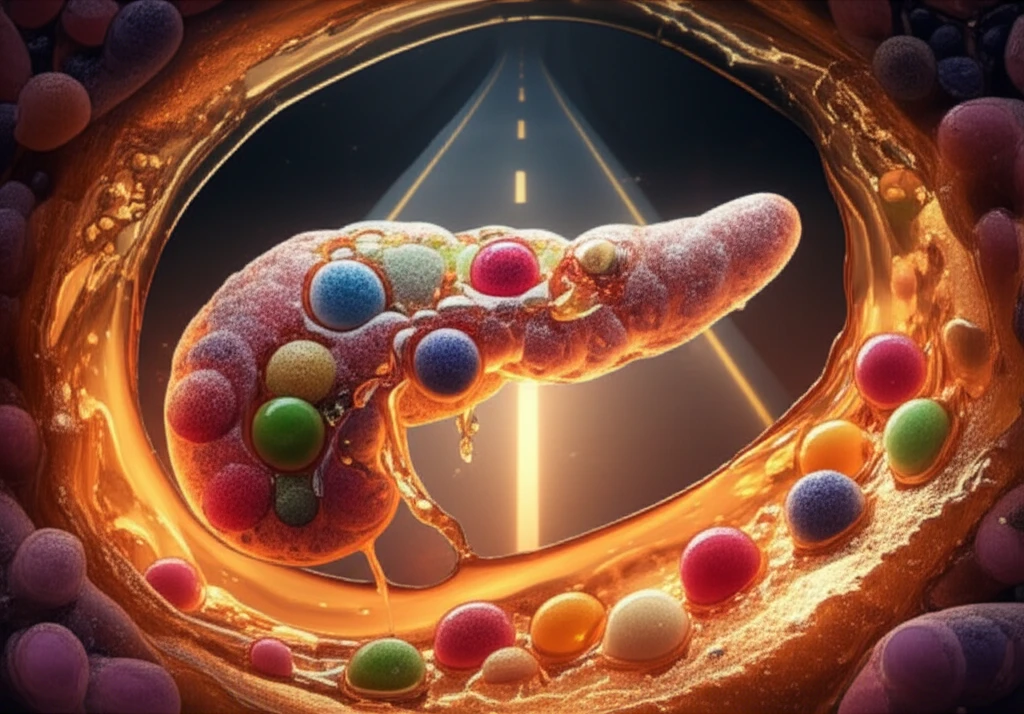
Sweet Poison? How High Glucose Fuels Pancreatic Cancer
"Uncover the surprising link between high glucose levels, ROS production, and pancreatic cancer cell growth, challenging conventional wisdom and paving the way for novel treatment strategies."
Pancreatic ductal adenocarcinoma (PDAC) is a formidable adversary, marked by alarmingly low survival rates, largely attributed to its late-stage diagnosis. As obesity and metabolic disorders surge, so does the incidence of PDAC, pointing to a concerning connection. Among these links, diabetes mellitus (DM), characterized by persistent high blood glucose (hyperglycemia), is increasingly recognized as a potential catalyst in cancer progression.
The question then arises: how does elevated glucose impact pancreatic cancer development? While the influence of high glucose (HG) on pancreatic tumorigenesis remains debated, researchers are delving into the underlying mechanisms. One key area of investigation is the role of reactive oxygen species (ROS), byproducts of oxygen consumption and cellular metabolism.
Emerging evidence suggests high glucose can influence pancreatic tumorigenesis through oxidative stress, specifically by promoting ROS production. However, the precise role of ROS in pancreatic cancer proliferation remains controversial, with some studies highlighting both pro- and anti-tumorigenic effects. Now, new research sheds light on this complex relationship, revealing how high glucose-induced ROS production may actually stimulate pancreatic cancer cell proliferation by disrupting a critical cellular pathway.
The Glucose-ROS-JNK Connection: A Cellular Balancing Act

The study reveals that high glucose levels promote pancreatic cancer cell growth while simultaneously increasing ROS levels within these cells, mirroring findings from other research. However, the real surprise lies in the behavior of the c-Jun N-terminal kinase (JNK) pathway, a key regulator of cell proliferation, differentiation, and apoptosis. The researchers discovered that high glucose conditions actually reduced the activity of JNK.
- High Glucose = Increased ROS & Decreased JNK: High glucose conditions lead to more ROS but less active JNK.
- NAC (Antioxidant) = Reduced ROS & Increased JNK: Lowering ROS with NAC boosted JNK activity.
- JNK Inhibitor = Promotes Cancer Cell Growth: Blocking JNK with SP600125 made cancer cells proliferate faster under high glucose.
Implications and Future Directions
These findings challenge the conventional view that ROS are always detrimental and highlight the complex interplay between glucose metabolism, oxidative stress, and cellular signaling in pancreatic cancer. Instead of always being a damaging agent, moderate increases in ROS may actually fuel cancer cell growth under certain conditions.
This research opens new avenues for therapeutic intervention. Rather than simply targeting ROS, future strategies may focus on modulating the JNK pathway to disrupt the pro-tumorigenic effects of high glucose. Further research is needed to fully elucidate the mechanisms involved and identify potential drug targets.
Ultimately, understanding the intricate relationship between glucose, ROS, and JNK signaling could lead to more effective treatments for pancreatic cancer, particularly in individuals with diabetes or metabolic syndrome.
